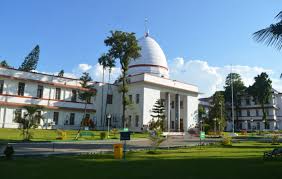Assam family claims 2 men may be pushed into Bangladesh; HC issues notice to State

A family from Assam has accused the state authorities of secretly deporting two of their relatives to Bangladesh. The Gauhati High Court responded by asking the government for clear information about the case. This situation has raised serious concerns about human rights and the handling of “foreigner” cases in Assam.
Family Raises Alarm Over Missing Men
Torap Ali, a resident of Kamrup district, filed a petition in the Gauhati High Court. He claimed that police picked up his uncles, Abu Bakkar Siddik and Akbar Ali, on May 25. Since then, no one from the family has heard from them.
According to Torap, the authorities did not allow his uncles to contact their family or a lawyer. This sudden silence made the family fear that the two men were forced across the Bangladesh border without legal process. Notably, both men were declared “foreigners” by a Foreigners Tribunal in 2017.
High Court Acts Quickly
The Gauhati High Court took immediate notice of the case. On May 27, the judges issued a notice to the Assam government. They asked for details about where Siddik and Ali are now.
During the initial hearing, the state’s lawyer told the court that both men were in the custody of the Assam Border Police. However, this information conflicted with the family’s claims. Because of this contradiction, the court set the next hearing for June 4 and demanded a full report from the authorities.
Assam’s Citizenship Controversies
This incident is not isolated. Assam has a long and complicated history with citizenship issues. Many people in the state have faced scrutiny over their nationality. The Foreigners Tribunals often declare individuals as “foreigners,” even when they possess official documents.
In 2019, the National Register of Citizens (NRC) excluded around 1.9 million people from its final list. Many of them are still trying to prove their citizenship. This confusion has created fear among thousands of families across the state.
Earlier Cases Raise Red Flags
Unfortunately, this is not the first such complaint. Earlier this month, a former school teacher named Khairul Islam vanished under similar circumstances. His family believes he was picked up and deported to Bangladesh, even though his appeal was pending in the Supreme Court.
These incidents suggest a troubling trend. People who still have legal options are being removed from the country without proper checks. This practice undermines trust in the legal system and may violate basic human rights.
Legal Experts Express Concern
Lawyers and rights activists have strongly criticized these alleged “pushbacks.” They argue that deporting someone without exhausting legal options breaks both Indian and international laws.
In addition, the absence of coordination with Bangladesh creates diplomatic issues. Bangladesh has not confirmed receiving anyone deported in this manner. If the country refuses to accept them, these individuals may become stateless. This would violate their right to identity and security.
Call for Accountability and Reform
Many civil society groups have demanded transparency from the government. They are asking for a clear protocol on how to treat people declared as foreigners. Legal experts have also urged the courts to protect those who still have appeals pending.
Political leaders from opposition parties have echoed these calls. They want an independent inquiry into the recent incidents. According to them, the government must ensure that no person is punished without a fair trial.
Why This Matters
These incidents go beyond the fate of just two men. They reveal deeper issues in the way Assam handles citizenship and migration. The system, as it stands, often leaves people helpless even when they follow legal processes.
The Gauhati High Court’s swift response offers a glimmer of hope. It shows that the judiciary is willing to hold authorities accountable. For many families in Assam, this case could set an important precedent.
Conclusion
The allegations made by the Assam family highlight urgent problems in the state’s approach to citizenship. The court’s demand for answers is an important step toward justice. As we wait for the hearing on June 4, the case continues to attract national attention.
In the end, this is not just about two missing individuals. It is about the fundamental rights of every person caught in the citizenship net. Transparency, legal fairness, and human dignity must guide the path forward.






